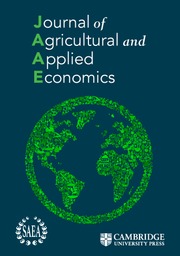Article contents
Some Fallacies in Agricultural Economics: A Macroeconomic Interpretation
Published online by Cambridge University Press: 28 April 2015
Extract
The relevance of macroeconomic theory to the analysis of economic behavior in the agricultural sector is a recurring theme in applied research in this area. On the one hand, it is possible to find the view that the agricultural sector should be treated in isolation as an independent market or set of markets not subject to the influences of changes in monetary and fiscal policy or (other) changes in aggregate demand and supply. On the other hand, it is also possible to find literal acceptance of the usefulness of macroeconomics—perhaps in the form of a particular version of the theory—with the controversial part surfacing in the particular view of macroeconomics and how it bears on (and is influenced by) agricultural markets. The fact that this dichotomy exists is highlighted by the contrasting views expressed recently by Breimyer (1981) and Tweeten. At the same time that Breimyer advocated that “macro-economics should be struck from the lexicon,” Tweeten chose to devote his AAEA Presidential address to a discussion of the implications of current developments in macroeconomic theory and policy for the agricultural sector; his particular emphasis is on the important role of “supply-side” macroeconomics.
- Type
- Research Article
- Information
- Copyright
- Copyright © Southern Agricultural Economics Association 1982
References
- 2
- Cited by


